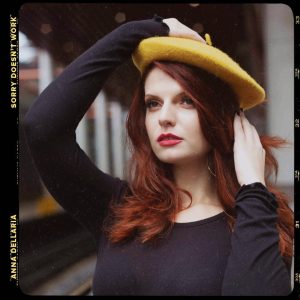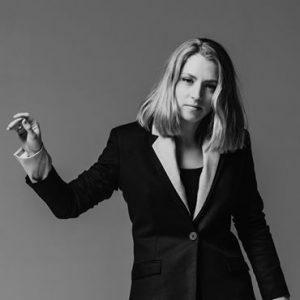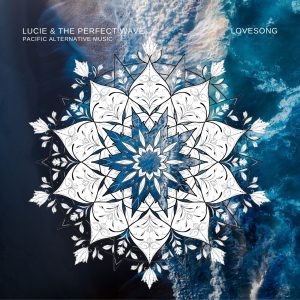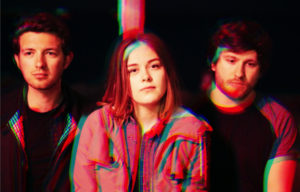
Singer-songwriter Anna Dellaria does not back down from darkness. Instead, she turns it into light, joining powerful vocals with lyrical catharsis. She believes that our darkest moments can be used as fuel for becoming stronger, powerful, and more in tune with ourselves. Her approach has garnered her the spotlight after a lifetime dedicated to the craft.
Anna studied at USC’s Thornton School of Music devoting ten hours a day to hone her voice. It was through the school’s program, that she caught the attention of industry icons and early supporters Lenny Waronker and Rob Cavallo. She also performed alongside John Fogerty, Chaka Khan, and others.
The iPhone demo of her song “Bolder” aired in the season finale of TV Land’s ‘Younger’. This resulted in a flurry of inquires and partnerships with Apple Music and Shazam for a formal release. Her music has also been featured on television and film as well as on Nickelodeon, HBO, and other networks.
Anna released her latest single, “Sorry Doesn’t Work”, in February and to this date, has accumulated over 64K streams. She is planning on releasing new music by the end of May.
I recently interviewed Anna via email about the success of her latest single, getting her song demo song “Bolder” aired on ‘Younger’, her songwriting process, the biggest challenge in her music career so far, and much more.
Congratulations on the release of your latest single, “Sorry Doesn’t Work.” What is the story behind the song?
Thank you! “Sorry Doesn’t Work” really just grapples with the reality that sometimes we can’t “fix” everything. It’s not quite an answer to anything, as much as it really just begs the question “is there any way I can help heal or take back what I did wrong”.
Your critically acclaimed previous single, “Baggage” was very successful. What have you learned from the experience of increased streams?
Thank you! It’s always really encouraging when songs resonate with listeners and are the main goal when sharing music: the hope that’ll it’ll connect with people.
Take me through the strategy for achieving that many digital streams and landing that many editorial playlist features for the song. If you didn’t have a strategy, how were you able to accomplish this?
The editorial love really came with “I Choose Me”, which was one of the debut singles. As a whole, I think releasing music that connects with curators and listeners is really the only “strategy” I can think of. I’m glad that the music continues to connect, and I am grateful for all of the support!
Explain your production process.
It kind of happens one of two ways. Either I’ll have started a demo on my own, with the song pretty much written, or I’ll go into a collaborative writing session in which we create something new start to finish.
Through the program you were in at USC’s Thornton School of Music, you caught the attention of early supporters and industry icons Lenny Waronker and Rob Cavallo while also performing alongside John Fogerty, Chaka Khan, and more. Explain how you got their attention and how you got the performing opportunities.
Really grateful to have had their support and appreciative of their mentorship! Through my music program, they were able to discover my original music, and offer me advice and mentorship.
After your debut single, “Sudden”, you had on your iPhone a demo of your song “Bolder” which aired on the season finale of TV Land’s “Younger”. How did this come about? And why was it an iPhone demo?
The supervisor of the show had heard the song and decided it fit with the ending scene in the season finale. The composer that produced the song was apart of some music for the show, and had sent the demo I initially recorded as an example that I assume they felt strongly enough about to just leave the original recording in!
Building on the previous question, your song placement on the TV show led to inquiries and partnerships with Shazam and Apple Music for a formal release of the song. Can you tell us more about that?
Because it was completely unplanned when the song aired, it was a bit chaotic haha. I was on a train to San Diego when I had recorded the voice memo for deadline purposes, and so when it aired both the producer and I were shocked (and excited) to find that a lot of viewers were eager for the full song and to find out who was behind it.
What do you attribute to your success in getting your songs featured across television and film including HBO and Nickelodeon?
I think just being open to opportunities and also a love for melodies of all kinds! It’s been really fun to work as not just an artist but creative in these new spaces.
How did it feel to sing during a national campaign for Ethan Allen during the 2018 Academy Awards?
Also a bit unexpected! I’m grateful for the opportunity and it was definitely fun to experiment with a sound way out of what I would normally do.
What has been your biggest challenge so far in your music career and how did you overcome it?
I’ve found the biggest challenge to be keeping “blinders” on and quieting outside voices. It’s easy to get wrapped up or blindsided by other people’s ideas or thoughts on the music and the industry as a whole. It’s been helpful to reconnect with my “why” I got into music and the feeling that comes when I sit down at a piano to sing with no expectations.
Take me through your songwriting process.
Generally, I’ll start on the piano with a melody or feeling in my head. Often times it almost feels like the song is already there and I just have to pick out the parts to put it together. I know which chords I want and where the melody needs to go. I’ll generally mumble some words or ideas that I later flesh out as a concept.
Explain what you mean by turning darkness into light in your music?
I’m a big believer in using our darkest moments as fuel for getting stronger, bigger, powerful, and more in tune with ourselves. Real growth comes from rising up from failure or hardship and I’ve found the process in which we do that really defines who we are and can empower us more than hurt us.
What is your favorite microphone or instrument to perform with and why?
My dream microphone is a Telefunken U47 for the tone and depth it offers for my voice. A lot of vocals today are pretty compressed and can be stylized to sound small, but I love a big dynamic vocal and I think the Telefunken does a great job of that. My go-to instrument is piano because it’s my primary instrument and feels most at home.
How do you think women indie artists can be better supported in the industry?
Lifting each other up is so important. Whether simply sharing new music by other womxn artists, or collaborating, etc. I think the biggest thing is creating awareness and also by offering more opportunities to femxle indie artists and providing more platforms for them to share their work.
What projects do you have planned for this year?
New music coming by the end of May!
Thank you, Anna, for the opportunity to interview you.
You can connect with Anna on Spotify Artist Profile | Website | Instagram | Twitter | Facebook
Anna Dellaria – Sorry Doesn’t Work | Music Human Sessions



